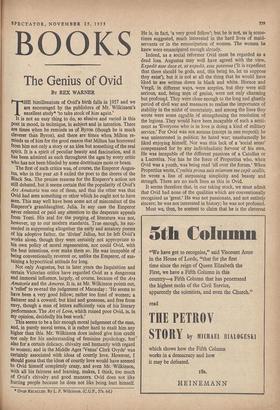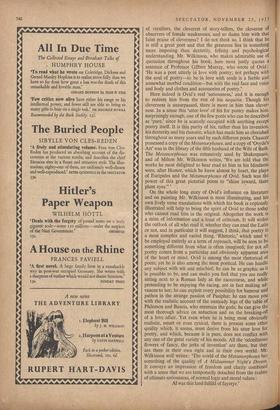BOOKS
The Genius of Ovid
BY REX WARNER THE bimillennium of Ovid's birth falls in 1957 and we are encouraged by the publishers of Mr. Wilkinson's excellent study* 'to take stock of him again.' It is not an easy thing to do, so elusive and varied is this poet in mood, in technique, in subject and in intention. There are times when he reminds us of Byron (though he is much cleverer than Byron), and there are times when Milton re- minds us of him for the good reason that Milton has borrowed from him not only a story or an idea but something of the real spirit. It is a spirit of peculiar beauty and fascination, and it has been admired as such throughout the ages by every critic who has not been blinded by some doctrinaire mote or beam.
The first of such critics was, of course, the Emperor Augus- tus, who in the year AD 8 exiled the poet to the shores of the Black Sea. The precise reasons for the Emperor's action are still debated, but it seems certain that the popularity of Ovid's Ars Amatoria was one of them, and that the other was that Ovid had seen something or other which he ought not to have seen. This may well have been some act of misconduct of the Emperor's granddaughter, Julia. In any case the Emperor never relented or paid any attention to the desperate appeals from Tomi. His zeal for the purging of literature, was not, however, up to our modern standards. True enough, he suc- ceeded in suppressing altogether the early and amatory poems of his adoptive father, the 'divine' Julius, but he left Ovid's works alone, though they were certainly not appropriate to his own policy of moral regeneration, nor could Ovid, with the best intentions, ever make them so. He was incapable of being conventionally, reverent or, unlike the Emperor, of sus- taining a hypocritical attitude for long.
Not only Augustus, but in later years the Inquisition and certain Victorian critics have regarded Ovid as a dangerous and immoral influence, largely, of course, because of the Ars Amatoria and the Amores. It is. as Mr. Wilkinson points out, a 'relief' to re-read the judgement of Macaulay : 'He seems to have been a very good fellow; rather too fond of women; a flatterer and a coward; but kind and generous, and free from envy, though a man of letters sufficiently vain of his literary performance. The Art of Love, which ruined poor Ovid, is, in my opinion, decidedly his best work.'
This seems to be a fair enough moral judgement of the man, and, in purely moral terms, it is rather hard to exalt him any higher than this. Mr. Wilkinson does indeed give him credit not only for his understanding of feminine psychology, but also for a certain delicacy, chivalry and humanity with regard to women; and in the Middle Ages 'Venus' Clerk Ovyde' was certainly associated with ideas of courtly love. However, I should guess that the ideas of courtly love would have seemed to Ovid himself completely crazy, and even Mr. Wilkinson, with all his fairness and learning, makes, I think, too much of Ovid's chivalry and good manners. Ovid does not like hurting people because he does not like being hurt himself.
* Ovm RECALLED. By L. P. Wilkinson. (C.U.P., 37s. 6d.)
He is, in fact, 'a very good fellow'; but he is not, as is some- times suggested, much interested in the hard lives of maid- servants or in the emancipation of women. The women he knew were emancipated enough already.
Indeed, as a social reformer Ovid must be regarded as a dead loss. Augustus may well have agreed with the view, Expedit esse deos et, ut expedit, esse putemus (`It is expedient that there should be gods, and, this being so, let us suppose they exist'), but it is not at all the thing that he would have liked to see written down in black and white. Horace and Vergil, in different ways, were sceptics, but they were still serious, and, being men of genius, were not only charming but profound. They were close enough to the long and ghastly period of civil war and massacre to realise the importance of stability in the midst of uncertainty, and among the lines they wrote were some capable Of strengthening the resolution of the legions. They would have been incapable of such a senti- ment as 'Everyone who is in love is doing a kind of military service.' For Ovid was not serious (except in one respect); he was uninterested in politics; he hated war; unashamedly he liked enjoying himself. Nor was this lack of a 'social sense' compensated for by any individualistic fervour of his own. He was incapable of the different passions of a Catullus or a Lucretius. Nor has he the force of Propertius who, when Ovid was a youth, was being read 'all over the forum.' When Propertius wrote, Cynthia prima suis miserum me cepit ocellis, he wrote a line of surpassing simplicity and beauty and strength. There are no such lines as this in Ovid.
It seems therefore that, in our taking stock, we must admit that Ovid had none of the qualities which are conventionally recognised as 'great.' He was not passionate, and not entirely sincere; he was not interested in history; he was not profound.
Must we, then, be content to claim that he is the cleverest of versifiers, the cleverest of story-tellers, the cleverest of observers of female weaknesses, and so damn him with that faint praise of cleverness? 1 do not think so. 1 think that he is still a great poet and that the greatness lies in something more imposing than dexterity, felicity and psychological understanding. Mr. Wilkinson, who makes admirable use of quotation throughout his book, here most justly quotes a sentence of Professor Gilbert Murray. who wrote of Ovid : `He was a poet utterly in love with poetry; not perhaps with the soul of poetry—to be in love with souls is a feeble and somewhat morbid condition—but with the real face and voice and body and clothes and accessories of poetry.'
Here indeed is Ovid's real 'seriousness,' and it is enough to redeem him from the rest of his riequitia. Though his cleverness is unsurpassed, there is more in him than clever- ness. In a sense this 'utter love' of his for poetry makes him, surprisingly enough, one of the few poets who can be described as 'pure,' since he is scarcely occupied with anything except poetry itself. It is this purity of his, rather than his invention, his dexterity and his rhetoric, which has made him so cherished throughout so many years and by such different poets. Chaucer possessed a copy of the Metamorphoses, and a copy of `Ovyde's Art' was in the library of the fifth husband of the Wife of Bath. The Metamorphoses was extensively used by Shakespeare, and of Milton Mr. Wilkinson writes, 'We are told that the works he most delighted to hear read to him in his blindness were, after Homer, which he knew almost by heart, the plays of Euripides and the Metamorphoses of Ovid. Such was the power of this great pictorial poem to "shine inward, there plant eyes." ' On the whole long story of Ovid's influence on literature and on painting Mr. Wilkinson is most illuminating, and his own lively verse translations with which his book is copiously illustrated will help to bring the spirit of Ovid to those today who cannot read him in the original. Altogether the work is a mine of information and a feast of criticism. It will widen the outlook of all who read it. whether they can read the Latin or not, and in particular it will suggest, I think, that poetry is a most complex and varied thing. 'Rhetoric,' which used to be employed entirely as a term of reproach, will be seen to be something different from what is often imagined; for not all poetry comes from a particular and obviously apparent area of the heart or mind. Ovid is among the most rhetorical of poets; yet he is also among the most poetical. He can handle any subject with wit and mischief; he can be as graphic as it is possible to be, and can make you feel that you are really sitting next to a Roman lady at the racecourse, and while pretending to be enjoying the racing, are in fact making ad- vances to her; he can exploit every possibility for humour and pathos in the strange passion of Pasiphm; he can move you with the realistic account of the unsteady legs of the table of Philemon and Baucis, who entertain the gods; he can give the most thorough advice on seduction and on the breaking-off of a love affair. Yet even when he is being most obviously realistic, smart or even cynical, there is present some other quality which, it seems, must derive from his utter love for poetry, and which, because it is pure, does not conflict with any one of the great variety of his moods. All the 'odoriferous flowers of fancy, the jerks of invention' are there, but they are there in their own right and in their own world. Mr. Wilkinson well writes : 'The world of the Metamorphoses has something of the quality of A Midsummer Night's Dream. It conveys an impression of freedom and clarity combined with a sense that we are temporarily detached from the realms of ultimate seriousness, of normal logic and moral values : Al was this land fulfild of fayerye.'



























































 Previous page
Previous page